In his hometown, Jimmy Carter unites Trump supporters and Democrats. To a point
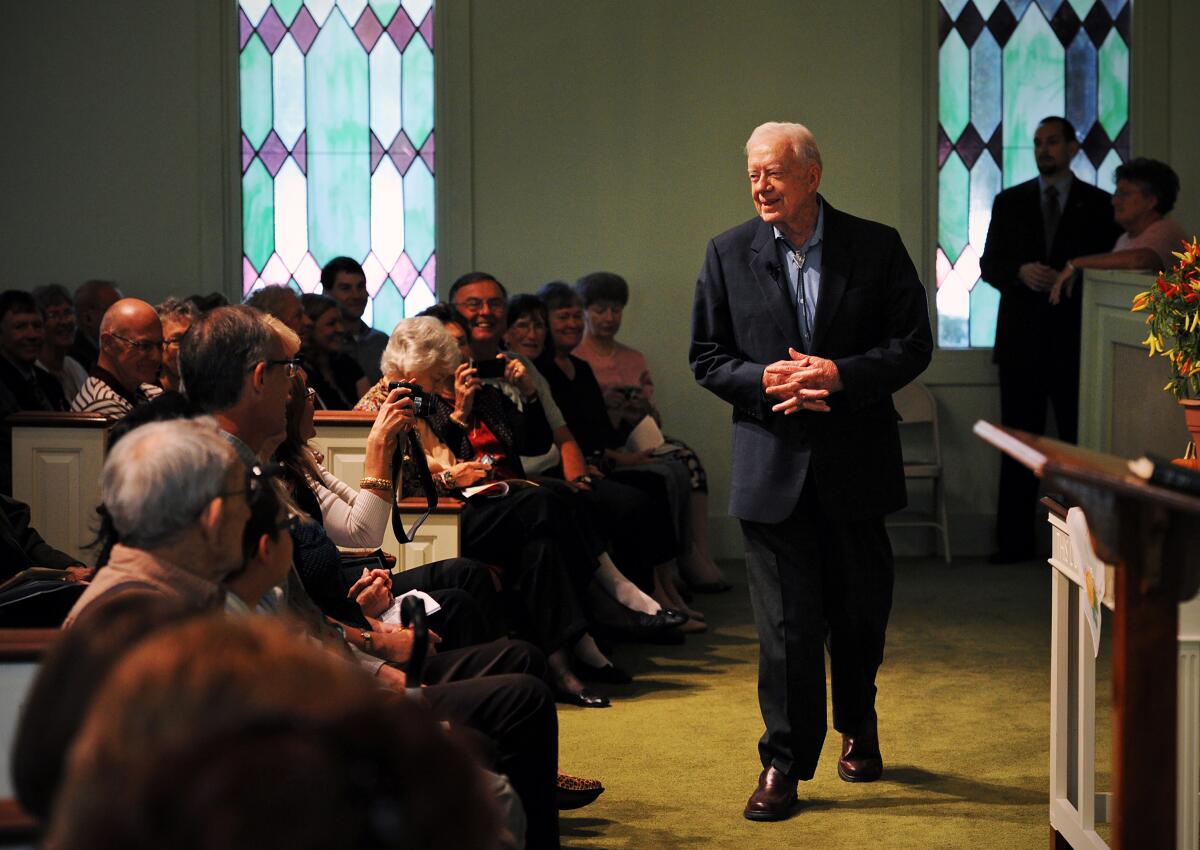
- Share via
PLAINS, Ga. — As mayor of the tiny Georgia town of Plains, L.E. “Boze” Godwin III is a Republican who presides over a living shrine to one of the South’s most famed Democrats.
Just behind City Hall, the old train depot that operated as Jimmy Carter’s presidential campaign headquarters is a museum festooned with a large 1970s banner proclaiming “Jimmy Carter! for president.”
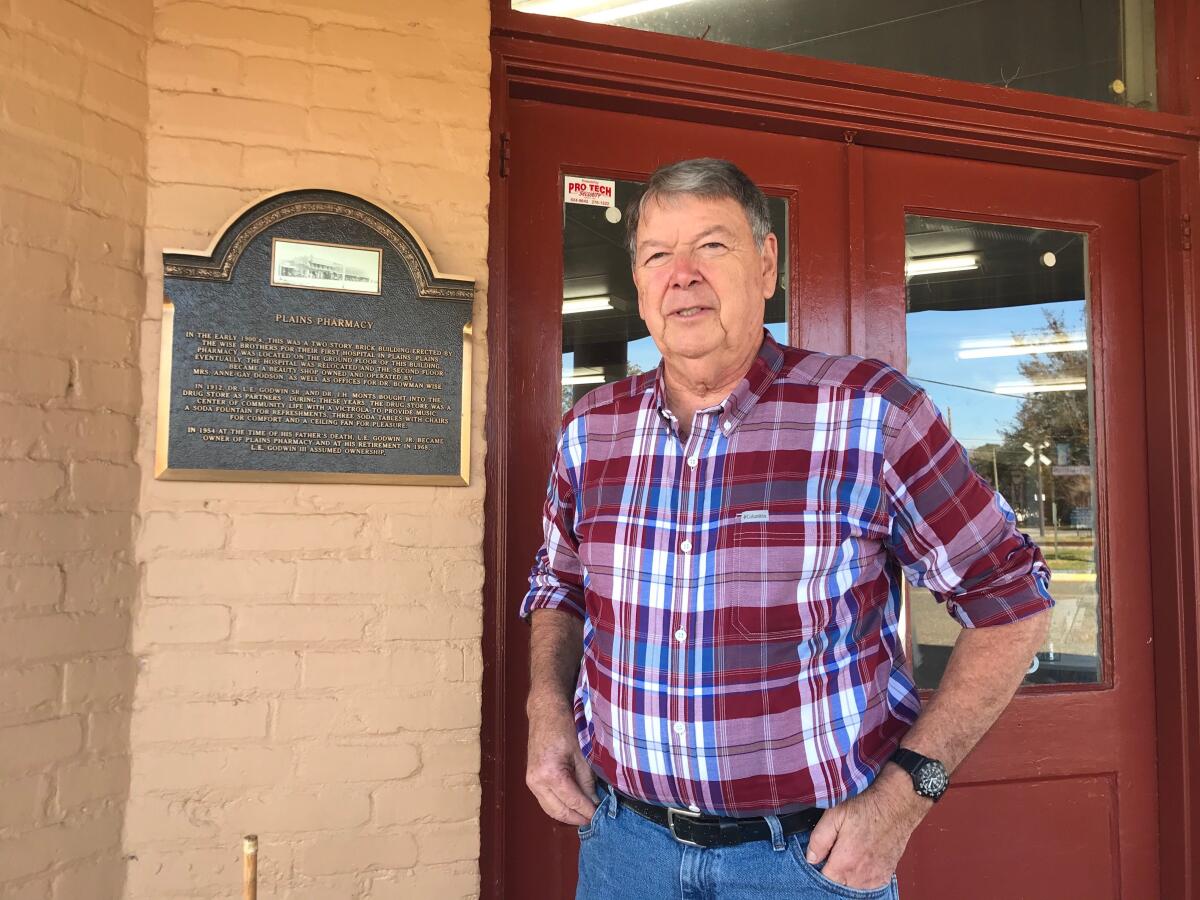
In the shadow of Carter’s old peanut processing plant, tourists stroll the one-block retail downtown strip and pick up peanut butter ice cream and peanut-shaped earrings, vintage Carter campaign buttons and bobblehead dolls. They visit Jimmy Carter‘s high school and the Jimmy Carter Boyhood Farm.
They can even find the 95-year-old Carter live in person, teaching Sunday school at Maranatha Baptist Church.
Godwin’s pride in his town’s connection to the nation’s 39th president shows no sign of ebbing now that Carter is the longest-lived president in American history (having eclipsed George H.W. Bush earlier this year).
Political fault lines in this formerly Democratic Southern town may have changed — Godwin and many other Plains residents are firm supporters of Donald Trump — but knock on pretty much any door, a turn-of-the-century mansion or tumbledown shack, and there is a stream of goodwill for Carter.
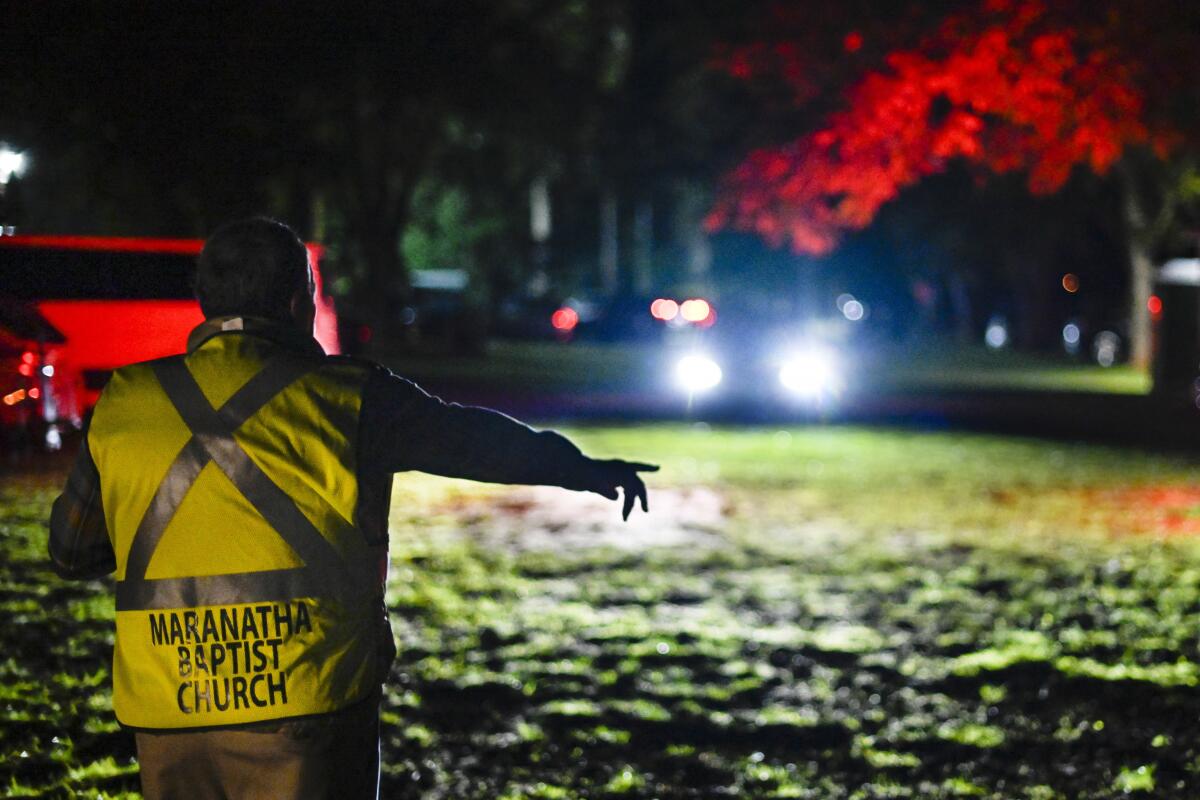
“The world may look at him as President Carter, but I look at him as a friend,” said Godwin, 76, a husky, soft-spoken pharmacist who has served as mayor for 36 years and looked up to Carter even longer. “I admire him very much for his accomplishments.”
In an age of rabid political partisanship, when many liberals and conservatives view their political opponents as enemies with alien values and lifestyles, Carter seems to inspire his hometown to transcend politics. Rich or poor, white or black, Republican or Democratic, residents do not dwell on political differences — at least not when Carter is around.
“We don’t talk politics,” Godwin said of Carter, a fellow deacon at Maranatha and his former Boy Scout leader. “He knows how I feel and I know how he feels. We don’t get into it.”
It’s not just that Mr. Jimmy, as he is known here, is a hometown boy. Or that he returned to his modest ranch home in this southwest Georgia town after his stint in the White House. Or that after a recent spate of falls and injuries, he is recuperating after a surgical procedure to relieve pressure on his brain.
In this southwest Georgia hamlet nestled amid cotton and peanut fields, where tractors regularly roll through downtown, Carter is another neighbor who shoots turkey and quail, drops off grapes after a neighbor’s surgery and volunteers at the local food bank.
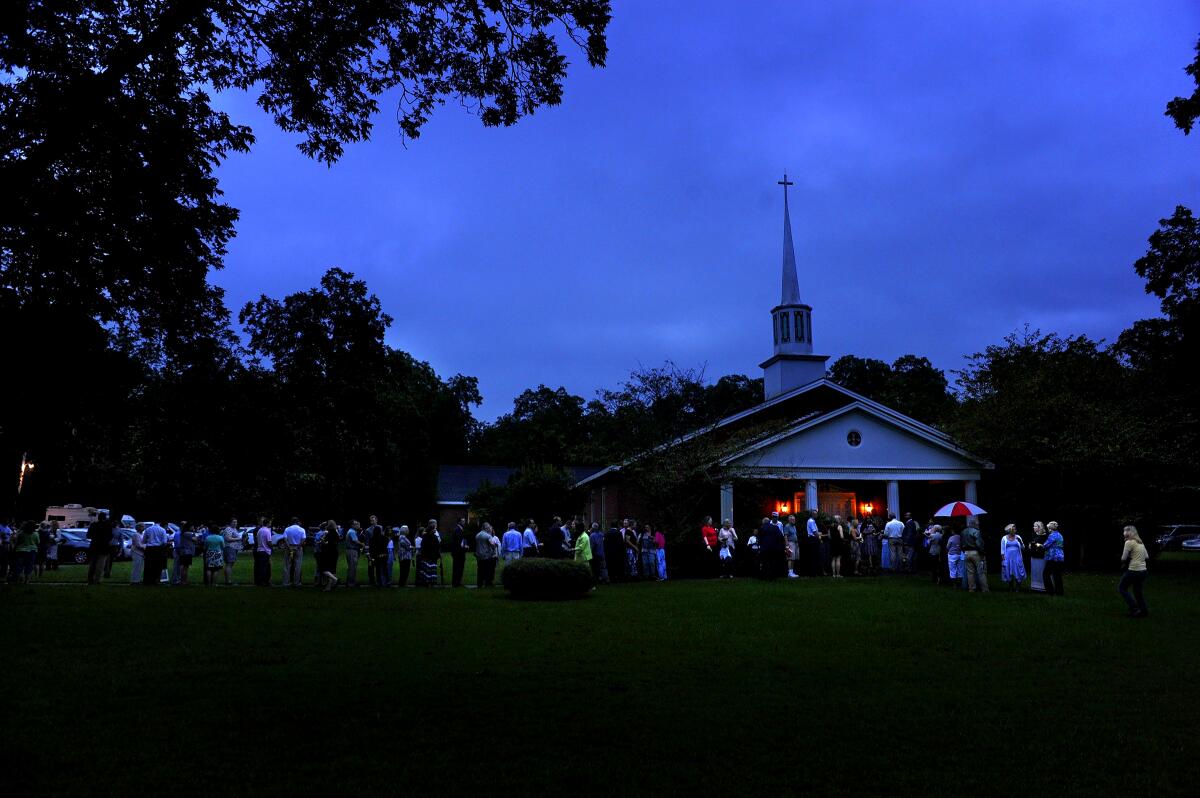
In his Sunday school role, he urges his congregation to love their neighbors, even their enemies.
“He’s just a love,” said Godwin’s wife, Betty, a whirling 75-year-old social butterfly who organizes Carter’s birthday parties.
“He’s kind of above politics,” said Carter’s longtime friend Jill Stuckey, superintendent of the Jimmy Carter National Historic Site, who regularly hosts the Carters at her handsome two-story home, which Carter’s parents rented a room in as newlyweds.
“He always thinks the best of people,” she added. “If he knows you’re on a certain political side, he’s not going to stir things up. He’s going to find common ground.”
Carter may be known across the globe for his efforts to broker peace, eradicate deadly diseases and build affordable housing. But he has also worked hard to ensure that Plains, population 700, does not suffer the steady decline of so many other rural Southern towns. Nearly two decades ago, he established the Plains Better Hometown Program, which converted abandoned Main Street storefronts into an inn and established an annual peanut festival.
With 40% of Plains residents living below the poverty level, Carter also used his influence to bring Dollar General to town when it didn’t have a grocery store, making sure it was positioned south of the railroad tracks, within walking distance to a neighborhood of poor, mostly black residents. Last year, after the town’s only medical facility closed, Carter was instrumental in persuading Mercer University to open a downtown health clinic.
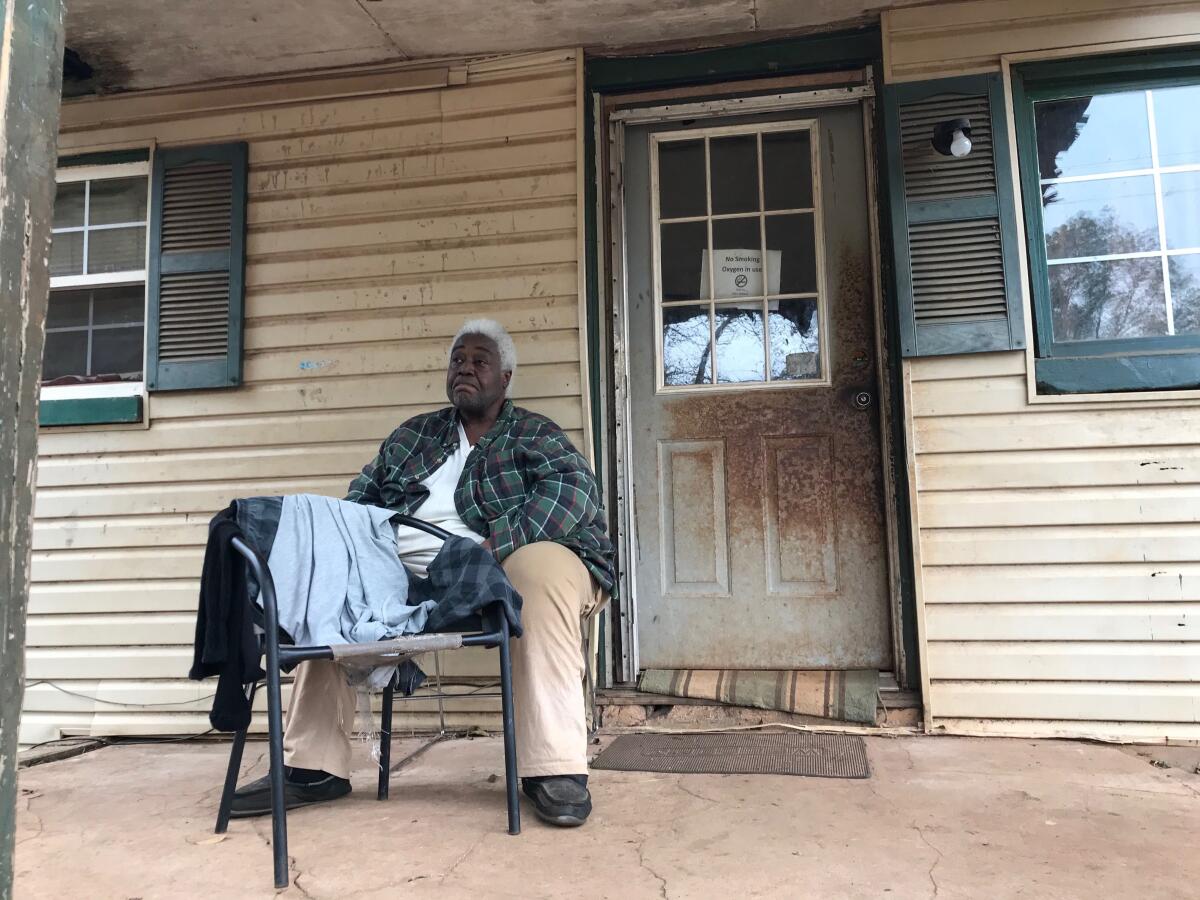
“If it weren’t for him, there would probably be no Plains,” said Bobby Salter, 80, from his downtown peanut and candy shop. “Like all these old Southern towns, it would be all done dried up.”
A block south, Joe Jackson, 66, a retired nurse, also praised Carter. Just a few weeks ago, the Carters helped out at the food bank where Jackson and other neighbors picked up meat, vegetables and canned goods.
“He’s always been good to everyone,” Jackson said as he sat on his front porch under a sagging, rotten roof. “Which, in the South, is unusual.”
But while Salter attributed his business success to the current occupant of the White House — “the economy’s real good and everyone’s spending money” — Jackson felt Trump has stoked up too much division.
“Things are better than they were, but we still got a long way to go,” Jackson said. “We got a devil for a president. Ew, he got a mouth on him!”
While Carter’s thick Georgia accent and his background as a born-again Baptist encouraged rural Southerners to support him in his 1976 White House run, many came to see him as weak and ineffectual as he struggled to respond to the energy crisis, high inflation and the seizure of American hostages in Iran.
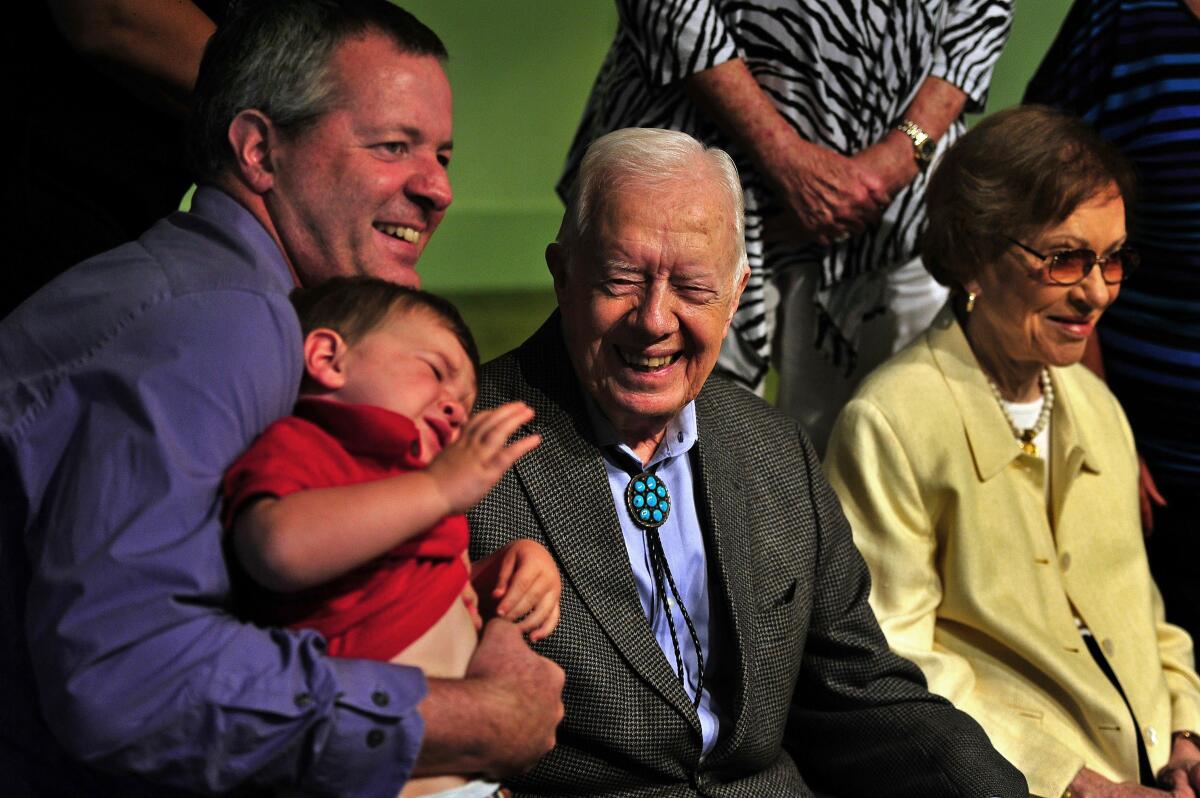
His progressive evangelism that focused on the poor and minorities met a backlash, part of a broader response to the surge of 1960s and ’70s liberalism. In 1980, Ronald Reagan wrested the South away from Carter and the Democrats, casting the poor as “welfare queens” and cutting taxes on the rich, ushering in 12 years of Republican control of the White House and the rise of the religious right.
Godwin, who has voted Republican in every presidential election since Carter’s, bemoans what he perceives as a leftward drift of Democrats. At least, he said, Carter was a liberal, unlike the entire roster of 2020 Democratic candidates, whom he dismisses as socialists.
While Godwin rails against House Democrats moving forward with the Trump impeachment hearings — saying they “do not give a damn about this country” — he has not broached the subject with Carter.
Carter said last month that he supported the House’s impeachment inquiry and urged Trump to “tell the truth ... for a change.”
At home, Carter tends to stick to local issues: inquiring after neighbors’ children and grandchildren and asking how business is doing.
Over the last few years, as Carter has suffered a series of health setbacks, he has continued to teach Sunday school when he can, reiterating his message of reaching out to the needy.
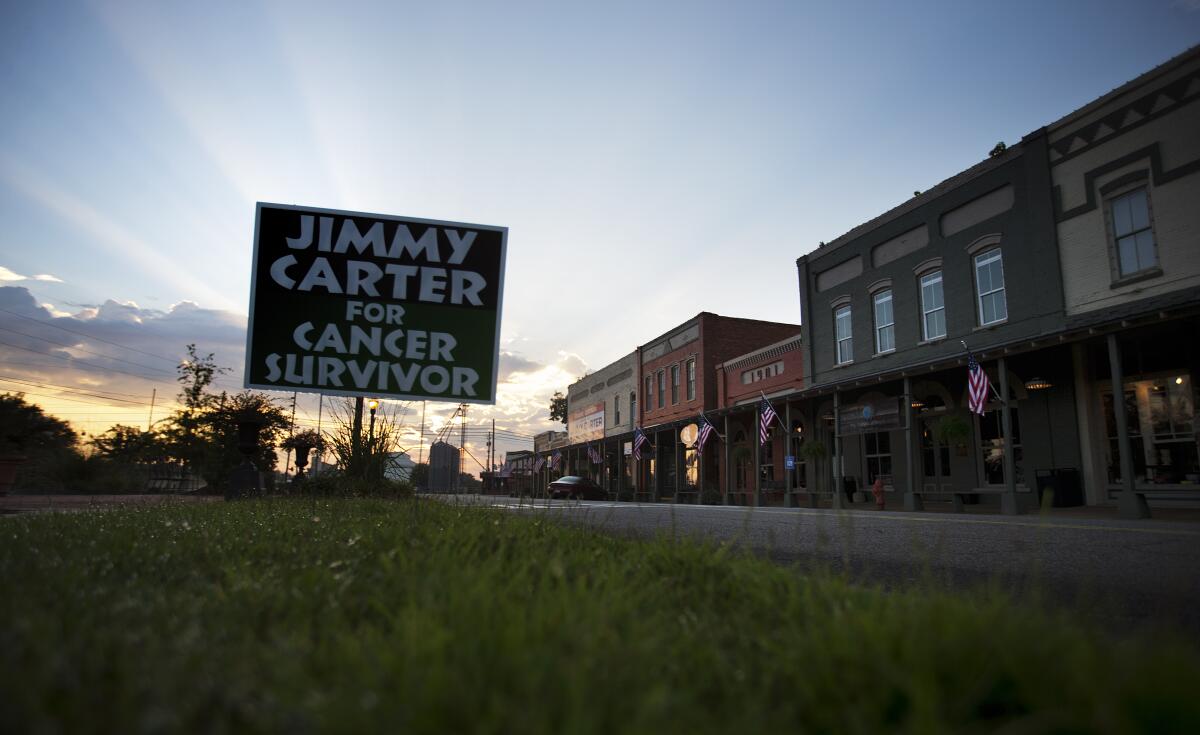
In his latest class at the red-brick chapel earlier this month, Carter said he was “absolutely and completely at ease with death” and went on to offer the congregation a simple prescription for making America a better country.
“Maybe, if you’re a housewife, bake a cake,” he said. “Think, ‘Who down the street from me would I be a new friend to by taking him or her half my cake?’”
“You don’t have to take it all,” he added, flashing his trademark toothy grin. “Just take half a cake.… Nothing fancy to it.”
The Rev. Tony Lowden, Maranatha’s first black pastor, said Carter is committed to raising up the rural South and addressing the growing chasm between rich and poor.
In recent months, Maranatha has upped its food assistance program, partnering with a South Georgia food pantry to feed 300 people each month. It also plans to link up with Habitat for Humanity, a group long associated with Carter, to work on repairing substandard housing for Plains’ lower-income residents.
“We’re determined as a church, as a community, to keep President Carter’s legacy going,” Lowden said. “To continue to love other people and to get outside the church walls.”
It is a mission Mayor Godwin believes in.
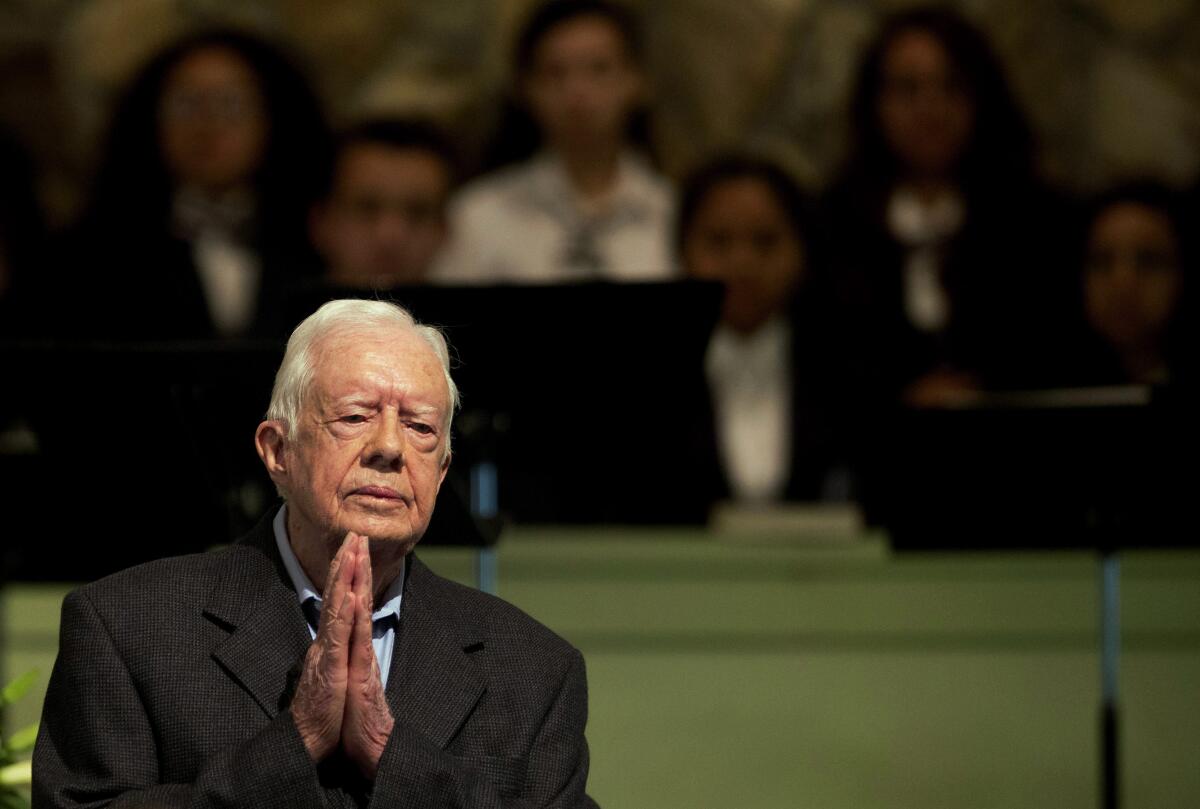
Over the years, he has accompanied Carter to Oslo for his acceptance of the Nobel Peace Prize, prayed alongside civil rights leader Andrew Young, handed Palestinian leader Yasser Arafat a key to his city.
The mayor was mortified when Arafat proceeded to kiss the old-school Southern Baptist on both cheeks — especially when local wags joked that the mayor kissed Arafat back.
Betty Godwin said she did not particularly admire Arafat, referring to him as “that horrible person.” But as good Southern people, she said, she and her husband just figured it would be rude not to host him.
Still, there are some limits to Plains hospitality.
In the heat of Georgia’s acrimonious gubernatorial race last year, many Plains residents did not show up when Carter invited Democrat Stacey Abrams to the new health clinic to discuss her proposals to address the crisis of rural healthcare in Georgia and to expand Medicaid.
The event was two doors down from his pharmacy, but Godwin, who supported Abrams’ Republican rival, Brian Kemp, did not attend.
“You don’t want to get me started with that woman,” he said.
More to Read
Sign up for Essential California
The most important California stories and recommendations in your inbox every morning.
You may occasionally receive promotional content from the Los Angeles Times.











